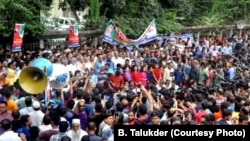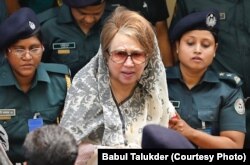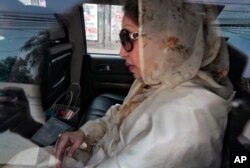As Bangladesh gears up for national elections later this year, the largest opposition party in the country is staging mass protests demanding the immediate release of their jailed leader, Khaleda Zia. The Bangladesh National Party (BNP) says the freedom of the former three-term prime minister should be a priority for the government in the interest of free and fair elections, which are expected to be held in December.
BNP chairperson Zia, 73, has been in jail since February after a court sentenced her over the alleged embezzlement of foreign funds meant for an orphanage trust.
“If Khaleda Zia can work freely leading the party during the election campaign, BNP will win overwhelmingly and form the next government. They are keeping her in jail simply to keep her away from our party’s election campaign,” Muhammad Jamiruddin Sircar, a senior BNP leader and former President of Bangladesh, told VOA. “She has been framed in a trumped up case and is a victim of political vengeance.”
BNP leaders also alleged she was being denied proper medical treatment in the jail.
“She is very sick. But, while being held in a damp near-abandoned jail she has no access to special medical treatment what she badly needs,” BNP leader A K M Wahiduzzaman, told VOA. “They are gradually pushing her towards death.”
Transfer of power
The Zia-led BNP and the Sheikh Hasina-led Awami League (AL), the party which is currently in power, used to alternate in government in metronomic regularity and the rivalry between the two leaders became known as “battling begums of Bangladesh.”
Between 1991 and 2006 Zia became the prime minister for three terms and Hasina for one.
But since Hasina became the prime minister for her second term in 2009, her party has been in power for 9 years.
When the Hasina-led government refused to hand over power to a caretaker government before the 2014 national elections, BNP boycotted the poll.
Opposition arrests
Zia, her son and four others were accused of embezzling BDT 21 million (USD $252,000) of foreign donations intended for a Bangladeshi charity named after her husband, former President Ziaur Rahman. In February, a court sentenced her to five years in jail. Five others, including her son, received jail-terms of 10 years each.
In May, Zia was granted bail by the Supreme Court in the trust case. But, she still remains in jail after being implicated in some other violence-related cases.
Thousands of BNP leaders and activists have been arrested in recent months, mostly on charges of political violence.
Dhaka University law professor Asif Nazrul said the arrests or detention of the opposition leaders and activists are still going on, apparently to undermine BNP’s ability to take part in the upcoming elections.
“By undertaking various oppressive measures, the government is trying to reduce the strength of BNP and at the same time they may be instigating them to initiate aggressive protests so that they could be maligned by the government-controlled media and more of the party’s leaders and activists could be sent to jail,” said Nazrul.
But senior leader and spokesperson of the ruling Awami League, Mahbubul Alam Hanif, denied the arrests are politically motivated.
“Many BNP leaders and workers participated in violent subversive activities in 2013, 2014 and 2015. They injured and killed people in many ways, including by throwing petrol bombs. The law enforced agencies are taking routine legal action against them because they were accused in those criminal cases,” Hanif told VOA.
“No innocent person will be arrested or harassed with any suit- this is a strict instruction from the government,” he added.
New demands
Earlier this month, BNP presented a list of demands to be fulfilled by the government before it would take part in election. Two of the major demands were the release of Zia with all cases against her scrapped and the dissolution of the Parliament ahead of the national election.
But Food Minister Kamrul Islam responded and said the government would not fulfill any of the BNP’s election-related demands.
“We will not fulfill any of their demands, but our government will conduct the national election in a free and fair manner, following the Constitution,” Islam said.
However, a BNP leader said that under no circumstance would his party boycott the election this time.
“In the past 9 years, over 200 BNP leaders and activists have been victims of enforced disappearance and over 6,000 of them have been victims of extrajudicial killings and other political murders. In the past months, over 12,000 of BNP leaders and activists have been detained or arrested,” BNP leader Wahiduzzaman told VOA. “But, we will make our best effort to campaign and take part in the national election this time.”
Professor Nazrul added that if free and fair voting takes place there is a “very high possibility” that AL would lose power. “This is mainly because of a strong anti-incumbency factor,” he said.


